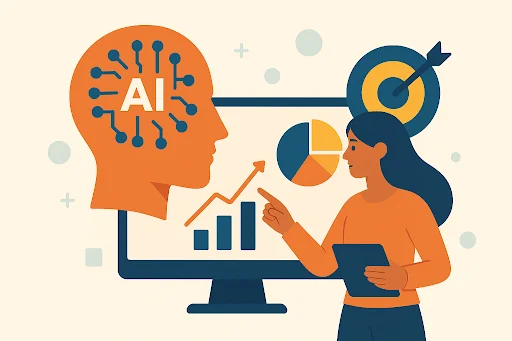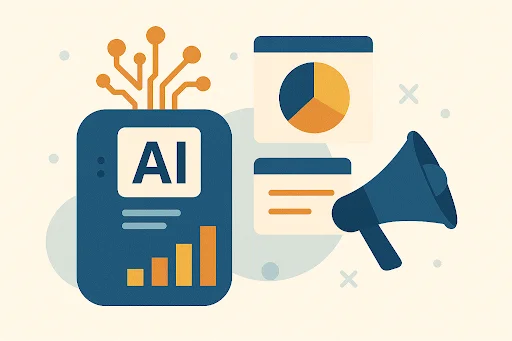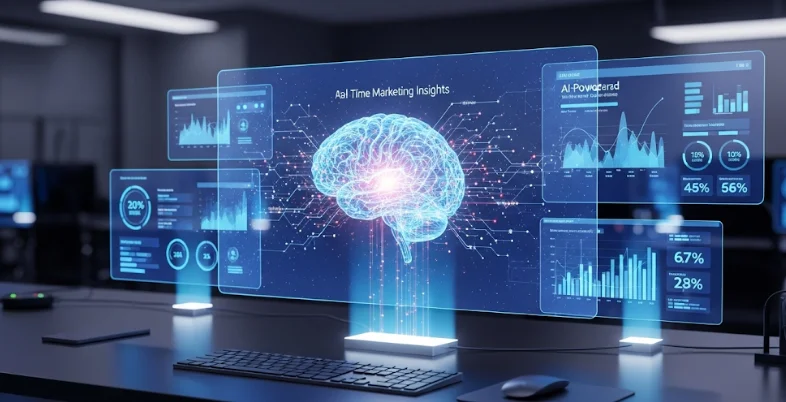Achieving success in marketing has never been more complex than it is today. And it’s not for the lack of tools or resources, on the contrary. Standing out among thousands and thousands of daily campaigns is the tough part. People want relevancy and their needs met as fast as possible.
Data-backed strategies and decisions have become fundamental for sending out the near-perfect message at the right time and getting the desired reaction. AI marketing analytics help you zero in on all the details necessary to optimize more personal and targeted campaigns, and ultimately achieve a higher ROI.
Let’s take a look at what AI-powered marketing analytics have to offer and how they can help you scale up.
What’s the Role of AI in Marketing Analytics?

In the field of marketing analytics, AI encompasses algorithms and models mimicking human thought – learning from experience, identifying patterns, and forecasting.
Historically, marketing analytics involved a lot of human labor to gather, scrub, and analyze data. AI does the opposite by doing much of the work for you. Rather than having to scroll through spreadsheets yourself, marketers can use AI to crunch massive amounts of data within seconds, recognize hidden relationships, and bring to the surface insights that would otherwise remain hidden. On the other hand, a lot of companies still need help in handling spreadsheets, so working with some of the Excel consulting experts can assure them their data is organized and standardized before using AI solutions.
The benefits of combining AI and traditional analytics are self-evident: speed, scale, and sophistication. Marketers have not only descriptive insights (what happened) but also predictive (what will happen) and prescriptive (what to do) capabilities.
5 Major Benefits of Using AI in Marketing Analytics

Let’s take a quick look at some of the more prominent benefits AI-powered marketing analytics bring to the table.
1. Data Insights
An AI system could read millions of customer interactions and detect subtle changes in purchasing behavior before they become obvious.
Even more powerful is data processing in real time. They will no longer have to wait for month-end reports; marketers can shift directions on the fly with AI marketing insights, keeping decision-making current with the fast-changing aspirations of consumers. AI insights by Coupler.io suggest that with the help of AI analytics, the time from detecting an issue to solving it can go down to as little as 10 seconds.
2. Improved Customer Segmentation
Customer segmentation has always been a success mantra for marketing. It goes to even greater heights with the use of predictive analytics to segment customers not only on demographics, but on behavior, interests, and intent as well.
For instance, it is possible for an AI solution to predict which segment of your audience is likely to churn most or which customers are likely to upgrade to premium service. This means it is possible to make very targeted strategies that resonate that much harder with each segment of customers.
For example, if you’re managing Facebook ads MCP, artificial intelligence will deliver insights and make tweaks automatically. That way, it ensures your campaigns reach the perfect audience at the right time.
3. Task automation
Marketers spend tons of time on exhausting tasks like pulling reports, collecting data, and tracking campaigns. Not to suggest these are not critical, but they’re time-consuming. And most of these can be automated with AI, leaving you free to deal with more creative, strategic efforts
Routine activities such as report automation, social media monitoring, and campaign performance can be delegated to AI. Time and productivity benefits are the twin strengths of this method. The in-house functions can free more time and effort for innovation and creative solution-finding by the teams instead.
4. Predictive Analytics
Forecasting is the secret to successful marketing. Whether forecasting demand on a seasonal basis or forecasting churn, having the ability to look into the future makes one a competitor.
AI enhances forecasting by analyzing large volumes of historical data and real-time data to make predictions about customer behavior in the future. For example, it can predict what products are likely to trend next quarter, so organizations can allocate resources effectively.
5. Improved Decision-Making
Finally, the goal of AI-based analytics is to help improve decision-making. By insights based on facts, AI helps leaders make improved, faster, and more credible decisions.
For example, large-box stores have used AI insights to more effectively price products, while streaming services rely on AI to present users with content that does not turn them off. These machine intelligence-driven decisions are likely to increase revenue and make customers more loyal.
Challenges and Considerations
The safest way to implement AI into your daily marketing tasks is to be familiar with its drawbacks, so you don’t get blindsided. Here are some of the challenges you might face:
1. Data Privacy and Quality
“AI is only as good as the data it’s provided,” according to a study by Thomas H. Davenport, Randy Bean, and Richard Wang. Wrong, outdated, or biased information can lead to faulty conclusions. Clean, complete, and properly structured data sets must be ensured.
With laws such as GDPR and CCPA, businesses must balance the need for high-quality information with the need to secure private information. Mistreated and exploited data can do mare harm to your brand than you could ever imagine.
2. Technology Dependence
Relying on AI-powered marketing tools is dangerous. Algorithms can make mistakes, and probably will. Human control is still the most important. AI can suggest a strategy, but human decision-making can still better determine the context and provide final judgment.
3. Integration with Existing Systems
Integrating AI tools into existing marketing frameworks is certainly not a walk in the park. Legacy systems, incompatibility between data types, or unavailability of in-house skills could slow adoption.
Solutions are to collaborate with suppliers who possess strong integration abilities, educate staff on how to use artificial intelligence marketing tools effectively, and follow a phased approach rather than trying to change systems overnight.
Top Most Important AI-Powered Tools and Technologies in AI Marketing Analytics
There are numerous AI-based tools available today, each one possessing unique capabilities. Some of the most popular ones include:
- Google Analytics with AI integrations: Provides predictive analysis and automated AI reporting.
- AI Insights by Coupler.io: Automatically interprets dashboard performance data, so you can move from analysis to strategy
- Salesforce Einstein: Integrates AI features into CRM solutions, such that customers engage more intelligently.
- HubSpot Marketing Hub: Uses AI to score leads, suggest content, and optimize campaigns.
- IBM Watson Marketing: Offers advanced cognitive abilities for analysis of complex customer journeys.
When selecting tools, businesses need to consider scalability, ease of integration, cost, and fit for specific marketing goals. A small company, for example, will prioritize affordability and ease of use, while a large company will prioritize scalability and advanced customization.
Future Trends in AI-Powered Marketing Analytics
The future of AI in marketing analysis holds only greater things. Some trends are impressive:
- Hyper-personalization: Beyond wide segments, AI will enable one-to-one marketing experiences that are bespoke for the individual customer.
- Voice and visual search analytics: With more and more use of smart speakers and visual search technology, marketers will need to adapt their analytics to support new inputs.
- Explainable AI (XAI): As algorithmic “black boxes” worry more and more people, explainability tools will be increasingly vital.
- Deeper customer experience (CX) integration: AI won’t just lead campaigns—it will help develop end-to-end customer experiences at every touchpoint.
Those who act early will get a chance to reap the benefits and get faster returns from their campaigns.
In Conclusion
Dealing with AI-related changes has become increasingly demanding, marketing not excluded. But those who refuse to adapt run a risk of being overlooked. It’s not a question of whether you should hop on this AI train, but how to do it smartly and efficiently.
Even though some hiccups need to be addressed, such as data privacy, tech dependency, and integrations, the results are well worth it.
So, it’s safe to say that if you’re prepared to test AI tools wherever you get a chance, and find your sweet spot, you’ll find yourself in a situation where you successfully predict your customers’ wants and needs, and deliver top-notch customer experiences.
FAQs
What is AI-powered marketing analytics?
AI-powered marketing analytics uses artificial intelligence innovations to help marketers gather, process, and understand data, and allow them to make precise, data-based choices. Also, it helps marketers predict customers’ needs and anticipate future dominating trends.
Can AI improve business marketing operations?
Yes, AI can be beneficial, no matter the company size. However, you should not rely completely on it. Instead, a personal touch and marketing experience, along with AI, will output the best results.
Will AI replace human marketers?
In short, no. At least not any time soon. Even though AI can deliver data with greater speed and accuracy, marketing success still largely depends on human creativity, insights, and authenticity.

